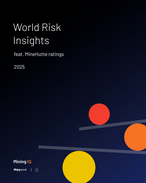This article is 4 years old. Images might not display.
The update comes as copper remains close to a near-10-year high reached in February, when it surged above US$9,000 a tonne and $4/lb for the first time since 2011, on tight supply and economic optimism.
SAVANT's global activity dispersion index average was 45.8 for February, compared with 46.5 a month earlier when significant falls were recorded across all regions.
The relatively small decrease month on month appeared to be the result of a reduction in China smelting over the Lunar New Year, as global ex-China activity continued to rebound, the pair said.
Asia ex-China saw a "significant improvement" from 48.8 in January to 55.2.
South America rose from 43 to 50.3 in February.
North America, which had registered "extremely low levels" in the previous two months rose from 33.2 in January to 44.1.
Europe was up slightly from 41.3 to 43 and the China index dropped from 50.3 to 42.
"The large decline in Chinese smelter activity was well anticipated due to the holiday period and should recover fairly quickly," Marex Spectron's global head of analytics Dr Guy Wolf said.
"Whilst the reasons for the continued weakness in Europe are understood, the encouraging signs of a rebound in the rest of the world, particular Asia ex-China, raise hopes for the second quarter.
"If the improvements seen in most regions continue through March, combined with a resumption in Chinese activity, the next month could be the first time in many months where activity level trends are aligned across all major regions."
Readings in the activity dispersion index above 50 indicated greater activity levels than average.
The platform was launched in October 2019 and monitors up to 90% of global copper smelting capacity.


























